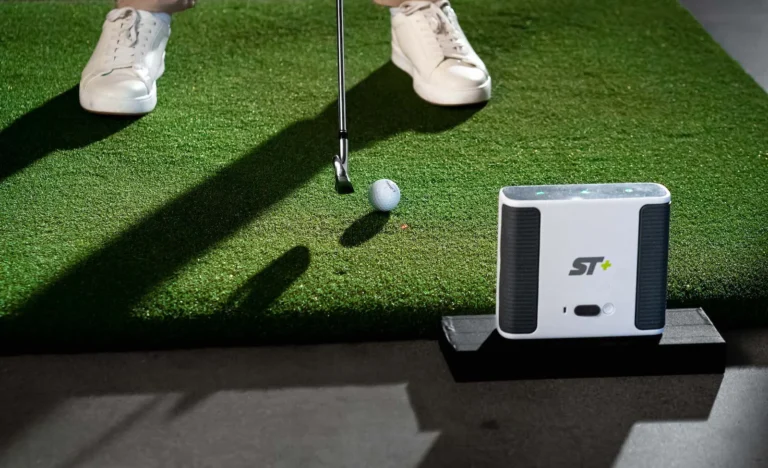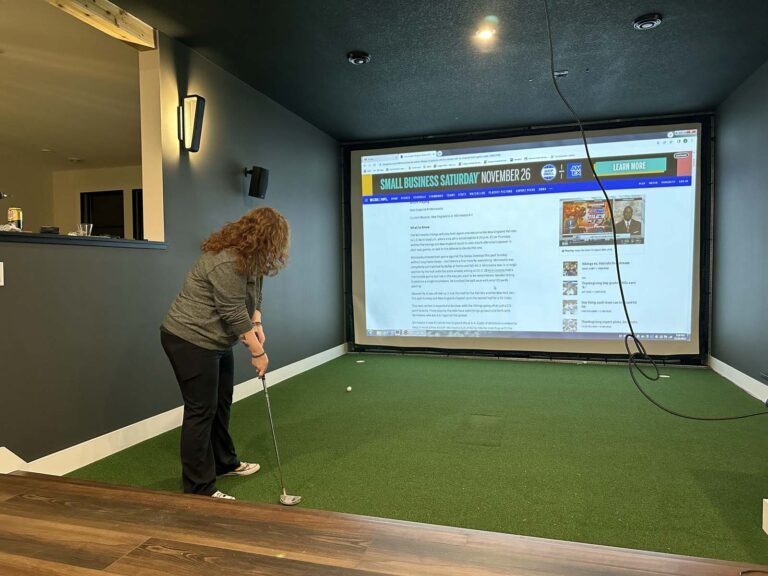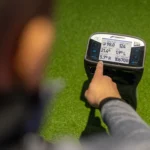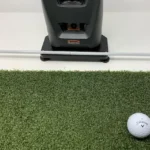I mean, who doesn’t love the idea of playing 18 holes in their pajamas, no commute required? A garage golf simulator is about bringing the range to you.
Plus, you can play rain or shine, day or night. But not all simulators are created equal—especially when it comes to garage spaces with limited height and width.
So let’s break down what really matters here.

Key Things to Consider Before You Buy
- Space Requirements
- Minimum Dimensions: Let’s get real here—space is your biggest consideration. Most simulators need at least 10 feet of ceiling height for comfortable swings, especially if you’re a taller player. In terms of floor space, a good rule of thumb is 10 feet wide and 15 feet deep.
- Setup Freedom: Your garage probably wasn’t designed with golf in mind, but there’s some flexibility. The right mat, adjustable nets, and a projector screen that can retract all help fit everything into whatever room you have.
- Budget
- What to Expect: Golf simulators range from about $500 for basic units up to $20,000 for the high-end setups. So, if you’re looking to stay within budget, there are definitely options. Generally, packages include the launch monitor, mat, net, and screen, but double-check so you’re not left scrambling for essential parts.
- Best Bang for Your Buck: Look for simulators that include everything you need—software, screens, and mats—in one package. SkyTrak and FlightScope Mevo+ are popular choices that balance cost and performance well for home setups.
- Ease of Setup
- If you’re like me, ease of setup might be the dealbreaker. While most systems require about an hour to set up, having some basic knowledge (or YouTube) nearby will save you some headaches. Look for systems that include mounting brackets and clear instructions.

The Best Garage Golf Simulators for 2024
Here’s the shortlist of simulators that make the cut for garage golf:
- SkyTrak SIG8 Simulator
- Why It’s Great: SkyTrak offers a solid mix of affordability and accuracy. With a clean interface and easy integration with software like E6 Connect, it’s perfect for an indoor setup.
- Best Feature: It’s compact enough for garages but doesn’t sacrifice on quality. This one’s ideal for golfers focused on shot feedback.
- FlightScope Mevo+ SIG8 Simulator
- Why It’s Great: This setup is known for its accuracy, especially with swing data. It’s not the cheapest option, but it’s worth the investment if you’re serious about improvement.
- Best Feature: The Mevo+ excels in data metrics, offering information like club speed and ball spin. Plus, it works both indoors and outdoors.
- Uneekor EYE XO Garage Package
- Why It’s Great: Uneekor specializes in advanced data and offers an immersive experience with high-end graphics and shot accuracy.
- Best Feature: If you’re after pro-level data, this is for you. The Uneekor EYE XO is on the pricier side but worth it for anyone looking to analyze every aspect of their swing.
- Garmin Approach R10
- Why It’s Great: The R10 is one of the most portable and budget-friendly options. If you’re low on space and looking for something flexible, this one’s a top pick.
- Best Feature: Super easy to set up and take down. Great for garages where the simulator can’t be a permanent fixture.

Software Options and What They’ll Cost You
- Essential Software to Look For: Software can make or break your experience, so you want something versatile. E6 Connect, TGC 2019, and FSX 2020 are big names offering a wide range of courses and data points.
- Monthly Fees: Some simulators charge extra for full access, with fees ranging from $100 to $300 annually. While it might seem steep, having realistic courses and up-to-date features will make your practice time a lot more engaging.

Accessories and Add-Ons That Make the Difference
- Projector & Screen
- For garage setups, a retractable screen can save space and protect your gear. A short-throw projector will help display realistic graphics without needing too much distance.
- Golf Mats & Nets
- Look for durable mats that don’t wear out quickly. Garage setups can be tough on mats, so invest in one that won’t flatten after a few swings. Nets should be sturdy enough to handle full swings without moving around.
- Lighting & Protectors
- Decent lighting can help you see all that valuable data clearly. Just make sure it doesn’t interfere with the launch monitor’s sensors.

How to Set Up a Golf Simulator in Your Garage
- Step-by-Step:
- Step 1: Clear out space and measure. Know exactly how much room you’re working with to avoid disappointments.
- Step 2: Set up your mat and net first. Adjust for your swing distance.
- Step 3: Install your launch monitor and connect it to your software.
- Step 4: Test your projector to make sure everything’s visible and aligned.
A little time spent on setup will pay off when you’re comfortably swinging away in your personal golf haven.

The Pros and Cons of Having a Garage Golf Simulator
Pros:
- Year-round play, rain or shine.
- Accurate feedback to improve your swing.
- Convenience—just head to the garage.
Cons:
- Requires significant space and initial investment.
- Limited outdoor vibes (let’s be honest, the garage isn’t Pebble Beach).
- Software fees can add up if you want premium options.
Maintenance Tips for Long-Lasting Performance
- Cleaning: Keep your projector lens clean, and avoid dust buildup around sensors.
- Calibration: Some simulators need occasional recalibration. Check with the manufacturer’s recommendations.
- Safety First: Protect windows, cars, and other valuables with nets or barriers. Nobody wants a hole in their garage wall from a missed shot!
FAQs About Garage Golf Simulators
Can I set up a simulator in a single-car garage?
Yes, as long as you have the minimum height and width. It might be a tighter fit, but a retractable setup can make it work.
What’s the most affordable simulator for a garage?
Garmin Approach R10 is budget-friendly and easy to set up, making it perfect for small spaces.
Are golf simulators accurate?
Absolutely, with some margin for error. Most simulators can reliably measure things like ball speed and launch angle.
Final Thoughts: Which Simulator Is Right for You?
If you’re a golf enthusiast or a weekend warrior looking to practice year-round, a garage golf simulator is a fantastic investment.
Whether you’re going all out with the Uneekor EYE XO or keeping it budget-friendly with the Garmin Approach R10, there’s a setup for everyone. The key is finding what fits your space and skill level while still delivering that immersive experience you’re after.
So, go ahead—set up that garage and get swinging! Your game will thank you.








